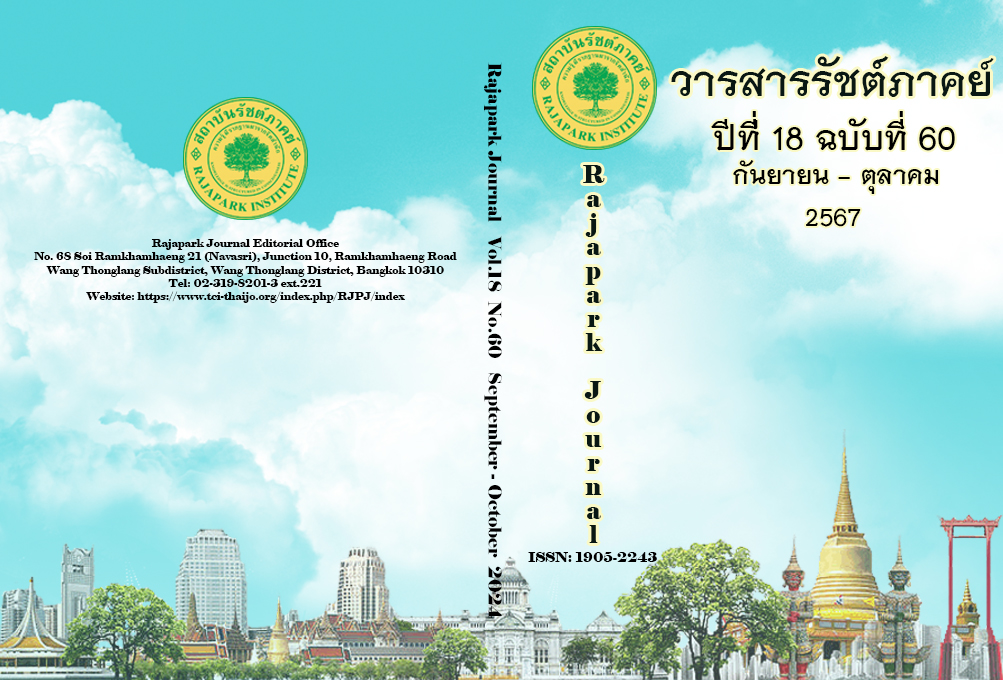The Relationship Among Wellness Tourism, Attitude Toward Wellness Activities, Social Media Norms, Satisfaction Wellness Activities and Intention to Participate Wellness Activities. Case Study: Thailand Riviera Area
Main Article Content
Abstract
This study focuses on wellness tourism in the Thailand Riviera Area (Petchaburi, Prachub Kiri Khun, Chumporn, and Ranong). The objective of this study is to examine the cause effects of Thailand tourists’ intent to participate in wellness activities, attitude toward wellness activities, social media norms, and satisfaction with wellness activities. Questionnaires were collected from 308 Thai tourists who traveled to the Thailand Riviera area and collected data that was then analyzed using structural equation modeling (SEM). The structural model proved to be a well-fitting model. The results indicate that the tourists’ attitude toward wellness activities and social media norms has an indirect effect on satisfaction with wellness activities. At the same time, satisfaction with wellness activities has an indirect effect on the intention to participate in wellness activities.
Article Details

This work is licensed under a Creative Commons Attribution-NonCommercial-NoDerivatives 4.0 International License.
Views and opinions appearing in the Journal it is the responsibility of the author of the article, and does not constitute the view and responsibility of the editorial team.
References
Ajzen, I. (1991). The theory of planned behavior. Organizational Behavior and Human Decision Processes, 50(2), 179-211.
Armutcu, B., Tan, A., Amponsah, M., Parida, S., & Ramkissoon, H. (2023). Tourist behaviour: The role of digital marketing and social media. Acta Psychologica, 240, 104025.
Ashton, A. S. (2018). Spiritual retreat tourism development in the Asia Pacific region: Investigating the impact of tourist satisfaction and intention to revisit: A Chiang Mai, Thailand case study. Asia Pacific Journal of Tourism Research, 23(11), 1098-1114.
Buhalis, D., & Leung, R. (2018). Smart hospitality—Interconnectivity and interoperability towards an ecosystem. International Journal of Hospitality Management, 71, 41-50. https://doi.org/10.1016/j.ijhm.2017.11.011
GWI. (2023). Global wellness economy monitor 2023. In: Author Miami.
Hair, J. F., Babin, B. J., Black, W. C., & Anderson, R. E. (2019). Multivariate Data Analysis: Cengage.
Harryono, M., Huang, Y.-F., Miyazawa, K., & Sethaput, V. (2006). Thailand medical tourism cluster. Harvard Business School Microeconomics of Competitiveness, 1-31.
Horner, S., & Swarbrooke, J. (2020). Consumer behaviour in tourism. Routledge.
Irving, P. (2014). The upside of aging: How long life is changing the world of health, work, innovation, policy, and purpose. John Wiley & Sons.
Jamil, K., Dunnan, L., Gul, R. F., Shehzad, M. U., Gillani, S. H. M., & Awan, F. H. (2022). Role of social media marketing activities in influencing customer intentions: A perspective of a new emerging era. Frontiers in Psychology, 12, 808525.
Leech, N. L., Barrett, K. C., & George, A. M. (2005). SPSS for intermediate statistics: Use and interpretation. Lawrence Erlbaum Psychological Bulletin, 70, 160-163.
Office of the National Economic and Social Development Board. (2017). National Strategy 20 years 2017-2036.
Oh, H., Assaf, A. G., & Baloglu, S. (2016). Motivations and goals of slow tourism. Journal of Travel Research, 55(2), 205-219.
Oliver, R. L. (2014). Satisfaction: A behavioral perspective on the consumer: A behavioral perspective on the consumer. Routledge.
Phetsome, S., & Ashton, A. S. (2021). Persuasion model toward smart social norms on wellness tourism in pre-retirement age group. In Paper presented at the Conference on Hospitality and Tourism 2021.
Ritpanitchajchaval, N., Ashton, A. S., & Apollo, M. (2023). Eudaimonic well-being development: Motives driving mountain-based adventure tourism. Journal of Outdoor Recreation and Tourism, 42, 100607.
Soonsap, P., Ashton, A. S., & Lee, T. J. (2023). The Role of Slow Food in Destination Image Development. Asian Journal of Business Research, 13(1).
Torabi, Z.-A., Shalbafian, A. A., Allam, Z., Ghaderi, Z., Murgante, B., & Khavarian-Garmsir, A. R. (2022). Enhancing memorable experiences, tourist satisfaction, and revisit intention through smart tourism technologies. Sustainability, 14(5), 2721.
Wang, L., Zhang, Q., Ding, Y.-Y., & Wong, P. P. W. (2023). The effect of social and personal norm on intention to patronize green hotels: Extension of theory of planned behavior. Journal of China Tourism Research, 19(2), 311-334.
Zhuang, X., Hou, X., Feng, Z., Lin, Z., & Li, J. (2021). Subjective norms, attitudes, and intentions of AR technology use in tourism experience: The moderating effect of millennials. Leisure Studies, 40(3), 392-406.


